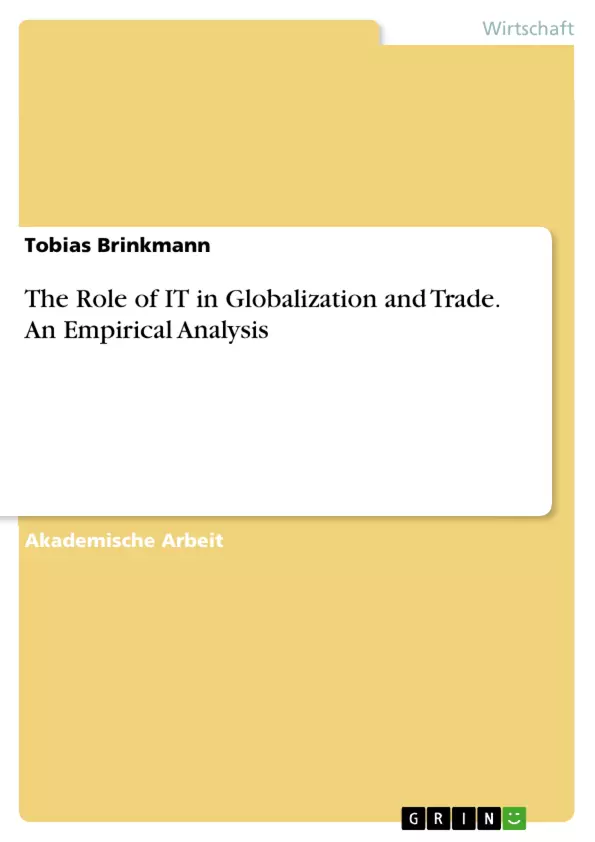The beginning of the twenty‐first century marks a period of sustainable changes in society and the economy. Particularly regarding global trade, globalization has slowed down its speed after the financial crisis in 2008. While diverse industries are confronted with profound technological and digital changes, this entails an increasing exchange of digital
products and R&D collaborations among competitors to thrive on new products. Therefore, the emergence of digital technologies requires new forms of collaborations and interactions among market participants. Companies engaged in cross‐border businesses have addressed evolving challenges in global trade by arranging production in international value chains, decentralizing hierarchical structures, relocating human capital and offshoring innovation.
The primary objective of this paper is to highlight the impact of these changes on international companies and countries engaged in global trade‐in‐tasks.
The introduction constitutes the first chapter and highlights the relevance of globalization from an economic perspective. The primary objective is to stress the urgency of the topic hence cross‐border value chains emerged, national borders are becoming increasingly blurred, and the advent of the Internet remarks the beginning of a new digitalized world.
The objective of the second chapter is to define the term globalization, to explain its characteristics, stages and to examine major changes in international value chains. Although a broad literature exists about the historic phases of globalization, evolving challenges and upcoming trends, only a few scholars have already evaluated digitalization as a new era of
globalization. Therefore, the third chapter critically discusses the associated chances and risks of trade in tasks on global markets and the influence and role of modern information technology to achieve competitive advantages in global trade.
Finally, the fourth chapter summarizes the key findings and assesses their relevance in a broader context. Besides, the
author provides a prospective outlook on how digitalization can further shape global trade.
Inhaltsverzeichnis
- 1 Introduction
- 2 Theoretical background
- 2.1 Definition of globalization
- 2.2 Digitalization - a new era of globalization?
- 2.3 Employment effects of trade in tasks
- 2.4 Impact of offshoring on innovation
- 3 Information technology in global value chains
- 3.1 R&D offshoring - IT as a competitive advantage
- 3.2 Smart contracts – technological advantages and expectations
- 3.2 Background of smart contracts
- 3.3 Technical use in international value chains
- 4 Conclusion
Zielsetzung und Themenschwerpunkte
Diese Arbeit untersucht die Bedeutung der Informationstechnologie (IT) für die Globalisierung und den internationalen Handel. Sie analysiert die Auswirkungen von Digitalisierung und Globalisierung auf Unternehmen und Länder, die am globalen Handel beteiligt sind. Insbesondere wird die Rolle der IT bei der Gestaltung internationaler Wertschöpfungsketten und der Steigerung von Wettbewerbsvorteilen beleuchtet.
- Die Definition und Charakteristika der Globalisierung
- Die Auswirkungen der Digitalisierung auf die Globalisierung
- Die Rolle der IT in internationalen Wertschöpfungsketten
- Die Bedeutung von Smart Contracts für den internationalen Handel
- Die Wettbewerbsvorteile durch den Einsatz von IT in der Globalisierung
Zusammenfassung der Kapitel
Kapitel 1 führt in die Thematik der Globalisierung und ihre Bedeutung für die Wirtschaft ein. Es hebt die Relevanz der Digitalisierung für den internationalen Handel hervor und erklärt, wie die IT zu neuen Formen der Zusammenarbeit zwischen Marktteilnehmern führt.
Kapitel 2 definiert den Begriff der Globalisierung und erläutert seine Charakteristika, Phasen und Veränderungen in internationalen Wertschöpfungsketten. Es untersucht die Chancen und Risiken der Digitalisierung als neue Ära der Globalisierung.
Kapitel 3 analysiert die Auswirkungen des globalen Handels auf die Beschäftigung und Innovation. Es beleuchtet die Rolle der IT bei der Steigerung von Wettbewerbsvorteilen durch R&D-Outsourcing und die Anwendung von Smart Contracts.
Schlüsselwörter
Globalisierung, Digitalisierung, Informationstechnologie, internationale Wertschöpfungsketten, Smart Contracts, Wettbewerbsvorteile, R&D-Outsourcing, globaler Handel, Beschäftigung, Innovation.
Häufig gestellte Fragen
Wie beeinflusst die IT die moderne Globalisierung?
Die IT ermöglicht neue Formen der Zusammenarbeit, die Dezentralisierung von Strukturen und die effiziente Steuerung internationaler Wertschöpfungsketten.
Was versteht man unter "Trade in Tasks"?
Es bezeichnet den internationalen Handel mit spezifischen Aufgaben oder Dienstleistungen statt mit fertigen Endprodukten, oft ermöglicht durch Offshoring.
Welche Bedeutung haben Smart Contracts für den globalen Handel?
Smart Contracts bieten technologische Vorteile bei der Abwicklung internationaler Verträge durch Automatisierung und erhöhte Transparenz.
Ist die Digitalisierung eine neue Ära der Globalisierung?
Ja, die Arbeit diskutiert Digitalisierung als eine neue Phase, in der nationale Grenzen durch das Internet und digitale Produkte zunehmend verschwimmen.
Wie wirkt sich R&D-Offshoring auf Unternehmen aus?
Unternehmen nutzen IT-gestütztes R&D-Offshoring, um Innovationsprozesse zu globalisieren und dadurch Wettbewerbsvorteile zu erzielen.
- Arbeit zitieren
- Tobias Brinkmann (Autor:in), 2021, The Role of IT in Globalization and Trade. An Empirical Analysis, München, GRIN Verlag, https://www.grin.com/document/1146553



